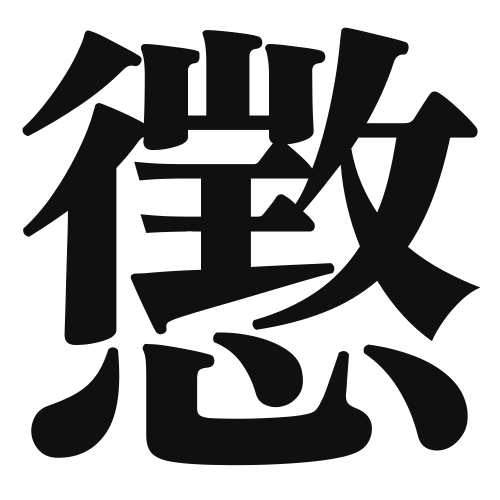1. Overview of Meaning
The kanji “懲” (chou) generally means “punish” or “discipline.” It conveys the idea of correcting someone’s behavior through punishment or reprimand.
2. Formation and Radical
Formation of the Kanji: The kanji “懲” is a compound character (会意文字) that combines elements to convey its meaning. It consists of the radical “忄” (heart) and the character “徴” (to summon or to collect), suggesting a connection between the heart and the act of discipline.
Radical: The radical of “懲” is “忄,” which relates to emotions and feelings, indicating that punishment often involves emotional aspects.
3. Examples of Usage
Common Words and Phrases:
- 懲戒 (ちょうかい, choukai) – disciplinary action
- 懲罰 (ちょうばつ, choubatsu) – punishment
Example Sentences in Daily Conversation:
- 彼は懲戒処分を受けた。 (かれはちょうかいしょぶんをうけた。) – He received disciplinary action.
- その行動には懲罰が必要だ。 (そのこうどうにはちょうばつがひつようだ。) – That behavior requires punishment.
4. Synonyms and Antonyms
Similar Kanji:
- 罰 (ばつ, batsu) – punishment; this term is more general and does not necessarily imply a corrective aspect.
- 戒 (かい, kai) – admonition; this focuses more on warning rather than punishment.
Antonyms:
- 褒 (ほう, hou) – praise; this represents a positive reinforcement, opposite to punishment.
5. Cultural and Historical Background
Relation to Japanese Culture: In Japanese culture, the concept of discipline is often tied to social harmony and responsibility. The kanji “懲” reflects the importance of correcting behavior to maintain order within society.
Proverbs and Idioms:
- 懲りない (こりない, korinai) – not learning from mistakes; this phrase indicates a person who repeatedly makes the same errors despite previous punishments.
